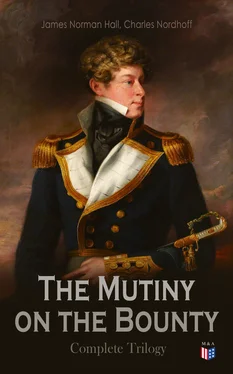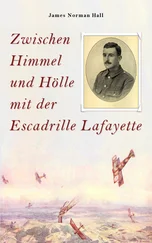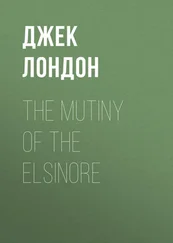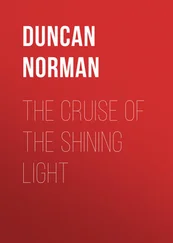At this moment Morrison came along the passageway, and as luck would have it Thompson’s attention was attracted by someone calling him from above. I beckoned Morrison into the berth, and he dodged in without having been seen. There was no need for words. I handed him one of the war clubs and took another for myself; then, together, we made a last effort to waken Young. Not daring to speak, we nearly shook him out of his hammock, but we might have spared ourselves the trouble. I heard Thompson call out, “He’s getting his clothes, sir. I’ll have him up at once.” Morrison drew back by the door and raised his club, and I stood at ready on the other side, for we both expected Thompson to come in for me. Instead of that he shouted, “Out of there, Byam, and be quick about it!”
“I’m coming,” I called, and again looked out of the doorway. My heart sank as I saw Burkitt and McCoy coming along from the fore hatchway. They stopped by the arms chest to speak to Thompson. Both had muskets, of course. Our chance to get at Thompson and the arms chest was lost unless they should pass on. Fortune was against us. We waited for at least two minutes longer and the men remained where they were. I heard Nelson’s voice calling down the hatchway: “Byam! Lively there, lad, or you’ll be left behind!” And Tinkler’s: “For God’s sake, hasten, Byam!”
It was a bitter moment for Morrison and me. The opportunity had been a poor one at best, but had there been time something might have come of it. We quickly put the war clubs aside and rushed out, colliding with Thompson, who was coming to see what I was about.
“Damn your blood, Morrison! What are you doing here?”
We didn’t wait to explain, but ran along the passage to the ladderway. Morrison preceded me, and in my haste to reach the deck, cumbered as I was with my bag of clothes, I slipped and fell halfway down the ladder, giving my shoulder a wrench as I struck the gratings. I clambered up again and was rushing toward the gangway when Churchill seized me. “You’re too late, Byam,” he said. “You can’t go.” “Can’t go? By God, I will!” I exclaimed, giving him a shove which loosened his hold and all but toppled him over. I was frantic, for I saw the launch being veered astern, one of the mutineers carrying the painter aft. Burkitt and Quintal were holding Coleman, the armourer, who was begging to go into the boat, and Morrison was struggling with several men who were keeping him back from the gangway. We were, in fact, too late; the launch was loaded almost to the point of foundering, and I heard Bligh shouting: “I can take no more of you, lads! I’ll do you justice if ever we reach England!”
When the launch had drifted astern, the man holding the painter took a turn with it around the rail and threw the free end to someone in the boat. Those left in the ship now crowded along the rail, and I had difficulty in finding a place where I could look over the side. I was sick at heart, and appalled at the realization that I was, indeed, to be left behind among the mutineers. Norton was in the bow of the launch holding the end of the painter. Bligh was standing on a thwart, astern. Of the others, some were seated and some were standing, and the boat was so heavily loaded as to have no more than seven or eight inches of freeboard. There was a great deal of shouting back and forth, and Bligh was contributing his full share to the tumult by bellowing out orders to those in the boat, and curses and imprecations against Christian and his men.
Some of the mutineers looked on silently and thoughtfully, but others were jeering at Bligh, and I heard one of them shout: “Go and see if you can live on half a pound of yams a day, you bloody villain!” Fryer called out, “In God’s name, Mr. Christian, give us arms and ammunition! Think where we go! Let us have a chance to defend our lives!” Others, the boatswain among them, joined earnestly in this plea.
“Arms be damned!” someone shouted back.
“You don’t need ’em.”
“Old Bligh loves the savages. He’ll take care of you!”
“Use your rattan on ’em, boatswain!”
Coleman and I sought out Christian, who was standing by one of the cabin gratings, out of sight of the launch. We begged him to let Bligh have some muskets and ammunition.
“Never!” he said. “They shall have no firearms.”
“Then give them some cutlasses at least, Mr. Christian,” Coleman urged, “unless you wish them to be murdered the moment they set foot on shore. Think of our experience at Namuka!”
Christian consented to this. He ordered Churchill to fetch some cutlasses from the arms chest, and a moment later he returned with four, which were handed into the boat. Meanwhile, Morrison had taken advantage of this opportunity to run below for some additional provisions for the launch. He and John Millward brought up a mess kid filled with pieces of salt pork, several calabashes of water, and some additional bottles of wine and spirits, which they lowered into the boat.
“You cowards!” Purcell shouted, as the cutlasses were handed in. “Will you give us nothing but these?”
“Shall we lower the arms chest, carpenter?” Isaac Martin asked, jeeringly. McCoy threatened him with his musket. “You’ll get a bellyful of lead in a minute,” he shouted.
“Bear off and turn one of the swivels on ’em!” someone else called. “Give ’em a whiff of grape!”
Burkitt now raised his musket and pointed it at Bligh. Alexander Smith, who was standing beside him, seized the barrel of the musket and thrust it up. I am convinced that Burkitt meant to shoot Bligh, but Christian, observing this, ordered him to be dragged back, deprived of his arms, and placed under guard. He made a terrific struggle, and it required four men to disarm him.
Meanwhile, Fryer and others were urging Bligh to cast off lest they should all be murdered. This Bligh now ordered to be done, and the launch dropped slowly astern. The oars were gotten out, and the boat, so low in the water that she seemed on the point of foundering, was headed toward the island of Tofoa, which bore northeast, about ten leagues distant. Twelve men made a good load for the launch. She now carried nineteen, to say nothing of the food and water and the gear of the men.
“Thank God we were too late to go with her, Byam!”
Morrison was standing beside me.
“Do you mean that?” I asked.
He was silent for a moment, as though considering the matter carefully. Then he said, “No, I don’t. I would willingly have taken my chance in her—but it’s a slim chance indeed. They’ll never see England again.”
Tinkler was sitting on a thwart. Mr. Nelson, and Peckover, Norton, Elphinstone, the master’s mate, Ledward, the acting surgeon—all were as good as dead, more than a thousand miles from any port where they might expect help. About them were islands filled with the cruellest of savages, who could be held at bay only by men well armed. Granted that some might escape death at the hands of the Indians, what chance had so tiny a boat, so appallingly loaded, to reach any civilized port? The possibility was so remote as to be not worth considering.
Sick at heart, I turned away from the sight of the frail craft, looking so small, so helpless, on that great waste of waters. There had been a cheer from some of the mutineers: “Huzza for Tahiti!” as Christian had ordered, “Get sail on her!” Ellison, McCoy, and Williams had run aloft to loose the fore-topgallant sail. Afterward a silence had fallen over the ship, and the men stood by the bulwarks, gazing at the launch growing smaller and smaller as we drew away from her. Christian, too, was watching, standing where I had last seen him, by the cabin grating. What his thoughts were at this time it would be impossible to say. His sense of the wrongs he had suffered at Bligh’s hands was so deep and overpowering as to dominate, I believe, every other feeling. In the course of a long life I have met no others of his kind. I knew him, I suppose, as well as anyone could be said to know him, and yet I never felt that I truly understood the workings of his mind and heart. Men of such passionate nature, when goaded by injustice into action, lose all sense of anything save their own misery. They neither know nor care, until it is too late, what ruin they make of the lives of others.
Читать дальше











